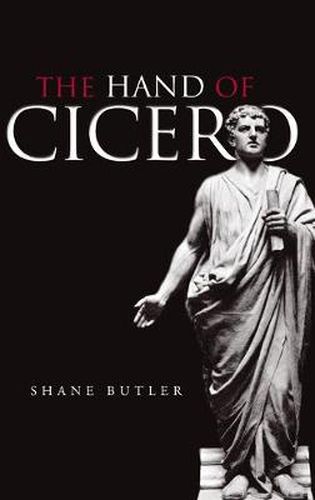Readings Newsletter
Become a Readings Member to make your shopping experience even easier.
Sign in or sign up for free!
You’re not far away from qualifying for FREE standard shipping within Australia
You’ve qualified for FREE standard shipping within Australia
The cart is loading…






Hundreds perished in Rome’s Second Proscription, but one victim is remembered above all others. Cicero stands out, however, not only because of his fame, but also because his murder included a unique addition to the customary decapitation. For his corpse was deprived not only of its head, but also of its right hand. Plutarch tells us why Mark Antony wanted the hand that wrote the Philippics . But how did it come to pass that Rome’s greatest orator could be so hated for the speeches he had written ? Charting a course through Cicero’s celebrated career, Shane Butler examines two principal relationships between speech and writing in Roman oratory: the use of documentary evidence by orators and the ‘publication’ of both delivered and undelivered speeches. He presents the groundbreaking thesis that the success of Rome’s greatest orator depended as much on writing as speaking; he also argues against the conventional wisdom that Rome was an ‘oral society’, in which writing was rare and served only practical, secondary purposes. Vivid and detailed, this work will be valuable not only for the fresh light it casts on one of the central figures of Roman history, but also for the new perspective it offers on a formative period in the literary culture of ancient Rome.
$9.00 standard shipping within Australia
FREE standard shipping within Australia for orders over $100.00
Express & International shipping calculated at checkout
Hundreds perished in Rome’s Second Proscription, but one victim is remembered above all others. Cicero stands out, however, not only because of his fame, but also because his murder included a unique addition to the customary decapitation. For his corpse was deprived not only of its head, but also of its right hand. Plutarch tells us why Mark Antony wanted the hand that wrote the Philippics . But how did it come to pass that Rome’s greatest orator could be so hated for the speeches he had written ? Charting a course through Cicero’s celebrated career, Shane Butler examines two principal relationships between speech and writing in Roman oratory: the use of documentary evidence by orators and the ‘publication’ of both delivered and undelivered speeches. He presents the groundbreaking thesis that the success of Rome’s greatest orator depended as much on writing as speaking; he also argues against the conventional wisdom that Rome was an ‘oral society’, in which writing was rare and served only practical, secondary purposes. Vivid and detailed, this work will be valuable not only for the fresh light it casts on one of the central figures of Roman history, but also for the new perspective it offers on a formative period in the literary culture of ancient Rome.